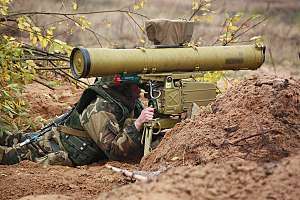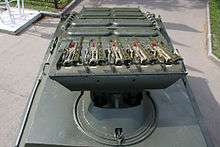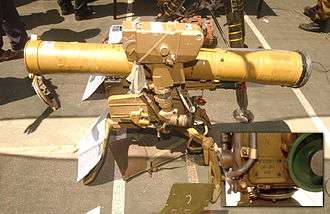9M113 Konkurs
| 9M113 Konkurs | |
|---|---|
 Belarusian SOF soldier of the 103rd Guards Separate Mobile Brigade with a 9M113 Konkurs missile. | |
| Type | Anti-tank missile |
| Place of origin | Soviet Union |
| Service history | |
| In service | 1974–present |
| Used by | See operators |
| Wars |
Syrian Civil War[1] Iraqi Civil War[1] War in Donbass[2] Yemeni Civil War (2015–present) Saudi-led intervention in Yemen (2015–present) Saudi–Yemeni border conflict (2015–present) |
| Production history | |
| Designed | 1970 |
| Manufacturer | Tula Machinery Design Bureau (Tula KBP) – Tulsky Oruzheiny Zavod |
| Variants | 9M113M |
| Specifications | |
| Weight | 14.6 kg (32 lb) |
| Length |
1,150 mm (45 in) 875 mm (34.4 in) without gas generator |
| Diameter | 135 mm (5.3 in) |
| Warhead | 2.7 kg (6.0 lb) 9N131 HEAT |
Detonation mechanism | Contact |
|
| |
| Engine | Solid-fuel rocket |
| Wingspan | 468 mm (18.4 in) |
Operational range | 70 m (230 ft) to 4 km (2.5 mi) |
| Speed | 208 m/s (680 ft/s)[2] |
Guidance system | Wire-guided SACLOS |
Steering system | Two control surfaces |
Launch platform | Individual, vehicle |
The 9M113 Konkurs (Russian: 9М113 «Конкурс»; English: "Contest"; NATO reporting name AT-5 Spandrel) is a Soviet SACLOS wire-guided anti-tank missile.
A development of the 9K111 Fagot with greater firepower, the 9M113 Konkurs can use the same launchers and is very similar visually, distinguishable only by a slight bulge towards the end of the Konkurs' missile tube.
Development
The 9M113 Konkurs was developed by the Tula Machinery Design Bureau (Tula KBP). Development began with the aim of producing the next generation of SACLOS anti-tank missiles, for use in both the man-portable role and the tank destroyer role. The 9M113 Konkurs was developed alongside the 9M111; the missiles use similar technology, differing only in size.
The original 9M113 with a single-charge warhead can penetrate 600 mm of rolled homogeneous armor (RHA).[2]
The missile entered service in 1974. Iran bought a license for the Konkurs in 1991 and began producing a copy, the Tosan (not to be confused with the Toophan), sometime around 2000.[3][4]
Description


The missile is designed to be fired from vehicles, although it can also be fired from the later models of 9M111 launchers. It is an integral part of the BMP-2, BMD-2 and BRDM-2 vehicles. The missile is stored and carried in a fiberglass container/launch tube.
The system uses a gas generator to push the missile out of the launch tube. The gas also exits from the rear of the launch tube in a similar manner to a recoilless rifle. The missile leaves the launch tube at 80 meters per second, and is quickly accelerated to 200 meters per second by its solid fuel motor. This initial high speed reduces the missile's deadzone, since it can be launched directly at the target, rather than in an upward arc. In flight, the missile spins at between five and seven revolutions per second.
The launcher tracks the position of an incandescent infrared bulb on the back of the missile relative to the target and transmits appropriate commands to the missile via a thin wire that trails behind the missile. The system has an alarm that activates when it detects jamming from a system like Shtora. The operator can then take manual control, reducing the missile to MCLOS. The SACLOS guidance system has many benefits over MCLOS. The system's accuracy is quoted in some sources as 90%, though its performance is probably comparable to the BGM-71 TOW or later SACLOS versions of the 9K11 Malyutka.
Models
- 9M113 Konkurs (NATO: AT-5 Spandrel, AT-5A Spandrel A)
- 9M113M Konkurs-M (NATO: AT-5B Spandrel B) Tandem warhead – with extended explosive probe. The warhead penetration is 750–800 mm vs RHA. Adopted in 1991.[5] Missile 9M113M 1990. Fagot/Kornet. Tandem (800 mm (behind a layer of ERA)). 4,000 m (3500 m night (passive)). Low price.[5][6]
- Towsan-1, Tosan, Towsan, or M113: Iranian licensed[7][2] 9M113M Konkurs-M (AT-5B Spandrel B) copy.[8] Introduced in early 2000.[3][9] Unclear if still in production.[10][11] Used primarily by paratroopers and armored vehicles.[12]
- 9N131M1 – Upgraded version.[2]
- 9N131M2-1 – The newest upgraded version.[2]
Operators


Current operators

































Former operators




See also
References
- 1 2 "Etat islamique: comment les djihadistes emploient les missiles antichars pour appuyer leurs offensives". France-Soir (in French). 4 May 2017.
- 1 2 3 4 5 6 Introduction to the 9M113 Konkurs ATGM - Armamentresearch.com, 28 July 2016
- 1 2 http://modlex.ir/cgi-bin/store.pl/page=product.html/pid=MXF05-000060
- ↑ Chistopher F. Foss, Jane's Defense Week, Another ATGW for IranAnother ATGW for Iran at the Wayback Machine (archived December 5, 2004)
- 1 2 "Противотанковый ракетный комплекс Конкурс-М - Ракетная техника". rbase.new-factoria.ru.
- ↑ ulyakinmariupol. "9М113М – противотанковая управляемая ракета".
- ↑ imp_navigator (1 March 2016). "Фото иранских TOW и "Конкурсов" вблизи".
- ↑ Jane's Missiles and Rockets, 2002
- ↑ "Another ATGW for Iran – Jane's Military Aerospace". May 26, 2000.
- 1 2 "Saudi-led Coalition seizes Iranian arms en route to Yemen – Armament Research Services". armamentresearch.com.
- ↑ TASS. "Iran to continue local production of Russian anti-tank missiles 9M11 and 9M113 TASS 10603161 – March 2016 Global Defense Security news industry – Defense Security global news industry army 2016 – Archive News year". www.armyrecognition.com.
- ↑ Galen Wright, Iranian Military Capability 2011 – Ground Forces – March 15th 2011
- ↑ "Algeria Has Developed Anti-Tank Weapons System Based on the BTR-60 - Defence Blog". 18 April 2015.
- ↑ http://www.army-technology.com/projects/kornet/
- ↑ Old missiles not so old after all – Russia Today, October 12, 2011.
- 1 2 3 4 5 6 7 8 9 10 11 12 13 14 15 16 17 "Future Artillery Systems: 2016 Market Report" (PDF). Tidworth: Defence IQ. 2016. Archived from the original (PDF) on 5 August 2016. Retrieved 21 January 2017.
- ↑ Bojevo gađanje polaznika SVO u Pješačkoj pukovniji, Croatian Ministry of Defence, February 29, 2012
- ↑ Military Balance 2018. IISS. 2018. p. 187. ISBN 978-1857439007.
- ↑ Pandit, Rajat (August 17, 2010), "India to order large number of Javelin anti-tank missiles from US", Times of India
- ↑ Pandit, Rajat (Jan 27, 2009), "India goes for 'urgent' purchase of anti-tank missiles", Times of India
- ↑ "CCS Clears USD 250 Million Konkur Missiles for Army". DefenceNow. 2012-10-26. Archived from the original on 2012-11-05.
- ↑ Small Arms Survey (2012). "Blue Skies and Dark Clouds: Kazakhstan and Small Arms" (PDF). Small Arms Survey 2012: Moving Targets. Cambridge University Press. p. 131. ISBN 978-0-521-19714-4.
- ↑ Josep Baqués Quesada (25 February 2018). "La modernización del Ejército de Tierra de Marruecos: datos e inferencias para una mirada estratégica". Análisis Grupo de Estudios en Seguridad Internacional (in Spanish).
- ↑ "Заказ на противотанковые ракетные комплексы «Конкурс-М» вырос в разы - Еженедельник «Военно-промышленный курьер»". vpk-news.ru.
- ↑ Small Arms Survey (2015). "Trade Update: After the 'Arab Spring'" (PDF). Small Arms Survey 2015: weapons and the world (PDF). Cambridge University Press. p. 107.
- ↑ News Of Yemen (30 January 2016). "Yemen war 2016 Houthi fighters use Russian KONKURS ATGM to destroy Saudi army Abrams Tank" – via YouTube.
- ↑ "War Is Boring - From drones to AKs, high technology to low politics". War Is Boring. Archived from the original on 2016-09-07. Retrieved 2017-02-28.
- ↑ Behnam Ben Taleblu. "Discerning Iran's Role in Expanding Houthi Rocket Capabilities - Foundation for Defense of Democracies". www.defenddemocracy.org.
Sources
- Hull, A.W., Markov, D.R., Zaloga, S.J. (1999). Soviet/Russian Armor and Artillery Design Practices 1945 to Present. Darlington Productions. ISBN 1-892848-01-5.
External links
| Wikimedia Commons has media related to 9M113 Konkurs. |